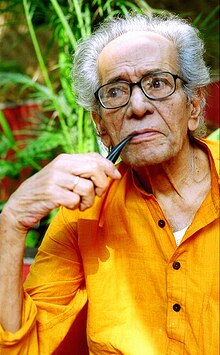Habib Tanvir | |
|---|---|
 Habib Tanvir at Prithvi Theatre, Mumbai; November 2005 | |
| Born | Habib Ahmed Khan 1 September 1923 |
| Died | 8 June 2009 (aged 85) |
| Occupation(s) | Playwright, dramatist, poet, actor |
| Years active | 1945–2009 |
| Spouse | Moneeka Misra (2001-2005) |
| Children |
|
| Honours | Padma Shri (1983) Padma Bhushan (2002) |
| Part of a series on |
| Progressive Writers' Movement |
|---|
Habib Tanvir (1 September 1923 – 8 June 2009[2]) was one of the most popular Indian Urdu playwrights, a theatre director, poet and actor.[2] He was the writer of plays such as, Agra Bazar (1954) and Charandas Chor (1975). A pioneer in Urdu and Hindi theatre, he was most known for his work with Chhattisgarhi tribals, at the Naya Theatre, a theatre company he founded in 1959 in Bhopal. He went on to include indigenous performance forms such as nacha, to create not only a new theatrical language, but also milestones such as Charandas Chor, Gaon ka Naam Sasural, Mor Naam Damad and Kamdeo ka Apna Basant Ritu ka Sapna.[3][4][5]
For him, true "theatre of the people" existed in the villages, which he strived to bring to the urban "educated", employing folk performers as actors alongside urban actors.[6] He died on 8 June 2009 at Bhopal after a three-week illness.[7][8] Upon his death, he was the last of pioneering actor-managers in Indian theatre, which included Sisir Bhaduri, Utpal Dutt and Prithviraj Kapoor,[9] and often he managed plays with a mammoth cast, such as Charandas Chor (Charandas the thief), which included an orchestra of 72 people on stage and Agra Bazaar, with 52 people.[10]
During his lifetime he won several national and international awards, including the Sangeet Natak Akademi Award in 1969, Jawarharlal Nehru Fellowship in 1979, Padma Shri[2] in 1983, Kalidas Samman 1990, Sangeet Natak Akademi Fellowship in 1996, and the Padma Bhushan in 2002.[11] He had also been nominated to become a member of the Upper House of Indian Parliament, the Rajya Sabha (1972–1978). His play Charandas Chor won him the Fringe Firsts Award at Edinburgh International Drama Festival in 1982,[12] and in 2007, it was included in the Hindustan Times' list of 'India's 60 Best works since Independence which said : "an innovative dramaturgy equally impelled by Brecht and folk idioms, Habib Tanvir seduces across language barriers in this his all-time biggest hit about a Robin Hood-style thief."[13]
- ^ Peck, Serena. "A former lover differs with Habib Tanvir's telling of their relationship". The Caravan. Retrieved 27 July 2019.
- ^ a b c Cite error: The named reference
:0was invoked but never defined (see the help page). - ^ Habib Tanvir makes his final exit The Times of India, 9 June 2009.
- ^ Contemporary Theatre McGraw-Hill encyclopedia of world drama, by Stanley Hochman, McGraw-Hill, inc. Published by Verlag für die Deutsche Wirtschaft AG, 1984. ISBN 0-07-079169-4. Page 42.
- ^ Habib Tanvir The Columbia encyclopedia of modern drama, by Gabrielle H. Cody, Evert Sprinchorn. Columbia University Press, 2007. ISBN 0-231-14424-5. Page 1330
- ^ Habib Tanvir Theatres of independence: drama, theory, and urban performance in India since 1947, by Aparna Bhargava Dharwadker. University of Iowa Press, 2005. ISBN 0-87745-961-4. Page 115.
- ^ Noted playwright Habib Tanvir passes away at 85 Sify.com, 8 June 2009.
- ^ Indian playwright Tanvir is dead BBC News, 9 June 2009.
- ^ A Farewell To The Bard Of Bhopal Tehelka, Vol 6, Issue 24, Dated 20 June 2009.
- ^ Doyen holds forth The Hindu, 5 May 2007.
- ^ "Padma Awards" (PDF). Ministry of Home Affairs, Government of India. 2015. Archived from the original (PDF) on 15 October 2015. Retrieved 21 July 2015.
- ^ Naya Theatre and Habib Tanvir
- ^ India's 60 best since Independence.He is dead[dead link] 14 August 2007.